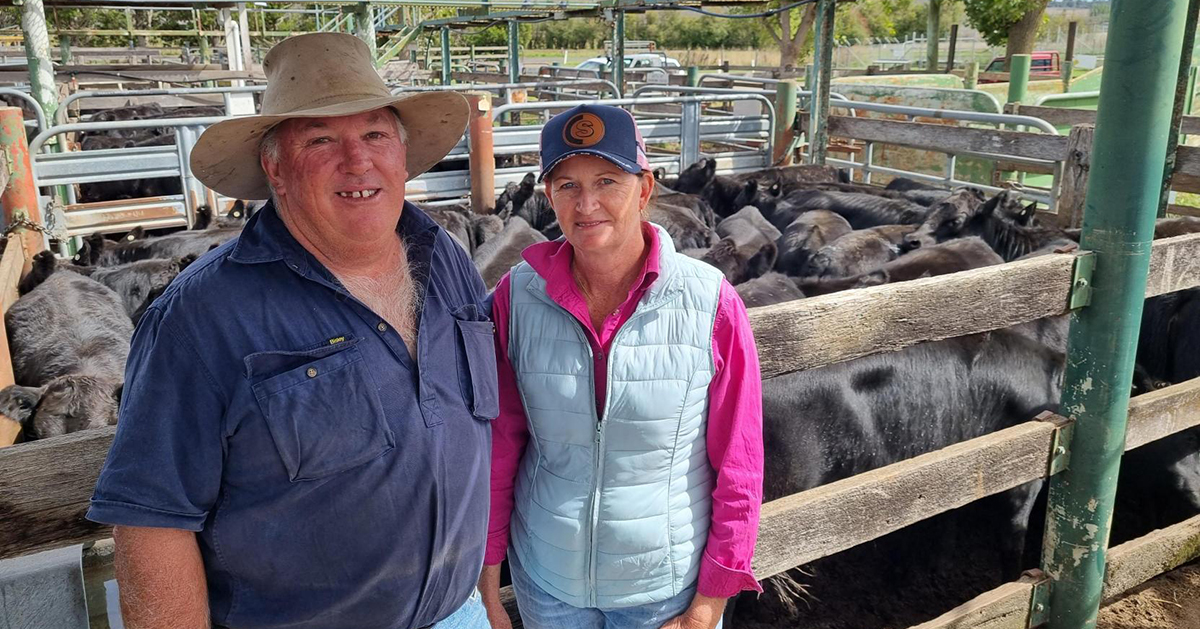Market Demand Drives Angus for “The Falls”


Wayne and Erica Dunn call the Glen Innes region home, settling 40km east at the township Glen Elgin in northern New South Wales.
Covering 1,800 acres, the Dunn’s property, “The Falls” runs 430 Angus cows and 80 replacement heifers across their country, with the addition of 700 acres of leased country located next to their holding. The land type is that of primarily of loam and clay soils, with 70% improved pastures and the remaining 30% made up of natural pastures.
The Dunn’s began farming on “The Falls” after purchasing the property in 2005, with their initial operation of trading steers and heifers and running a hay baling contracting business. In 2010 they purchased 250 Angus cows in calf, and have since continued their beef cattle business, selling the progeny as weaners. In doing so the Dunn’s cite that this process allows them to control what they were breeding and selling, with a self-supply of weaners.
When it comes to their choice to utilise Angus genetics in their herd, the Dunn’s highlight the market versatility and the demand for Angus as their driving motive.
“The Angus breed was our choice as this is what the beef market was directing towards as a preferred weaner purchase,” they said. “Our herd is 100% Angus with bulls purchased locally.”
When it comes to managing their herd, the Dunn’s join from 18 months of age, with their joining period starting late September. Running the cows and heifers with bulls for 10 weeks, the Dunn’s will extend the joining period if the season is dry and unfavourable.
Heifers are joined with yearling bulls, which the Dunn’s have noted has limited any issues with calving these heifers down. The Dunn’s currently sit at an 85% joining rate.
In the lead up to joining the Dunn’s keep to their yearly management plan of drenching and B12 and selenium injection. When it comes around to calving, they supplementary feed with barley stubble and lick blocks to assist the nutrition of the females.
When it comes to choosing the bulls best suited for their herd, the Dunn’s said, “Selection of bulls is mainly by what we visually like of a bull: straight long length, good feet, good structure and temperament.”
Females are culled out of their herd based on broken mouths, bad feet or if they are dry, and cull cows are typically killed with the MSA market, however this is dependent on the grid prices of processors at the time of culling.
For the self-replacement of their female herd, the Dunn’s retain 60-80 heifers annually.
The end market for their operation is the weaner sales, which typically take place late March to early April in the New England region. The Dunn’s sell all steer progeny, as well as the heifer progeny that were not selected to be retained back into the female herd. The progeny selected for market is sold directly off their mothers.
When asked about their breeding philosophy and the objectives for their operations, Erica Dunn said, “Our aim is to produce a good quality product, that buyers will continue to purchase for top price.”
“Though the future is always an unknown, we plan to continue to do the same even though you have years of ups and downs as they seem to average out over time.”
“We are happy that we have achieved what we had planned for our herd and property. Sticking to a plan, we slowly got there over the years with no regrets.”
Feature Image: Wayne and Erica Dunn
– Cheyne Twist, Senior Marketing and Communications Officer